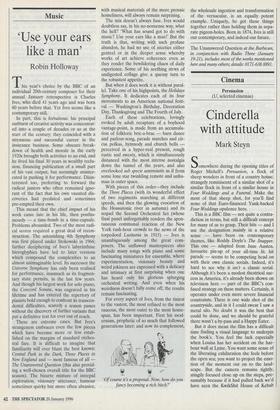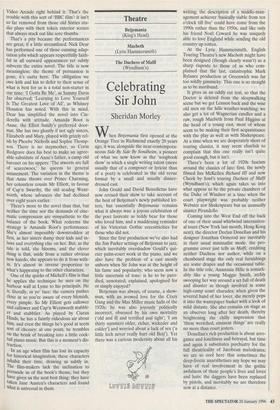Cinema
Persuasion
(U, selected cinemas)
Cinderella with attitude
Mark Steyn
Somewhere during the opening titles of Roger Michell's Persuasion, a flock of sheep wonders in front of a country house, strangely reminiscent of a similar shot of a similar flock in front of a similar house in Four Weddings and a Funeral. Make the most of that sheep shot, for you'll find none of that Euro-financed Yank-backed Four Weddings opulence here.
This is a BBC film — not quite a contra- diction in terms, but still a difficult concept for many of us to grasp. Their hits — and I use the designation mainly in a relative sense — have been on contemporary themes, like Roddy Doyle's The Snapper. This one — adapted from Jane Austen, favourite pin-up of your all-time lit. hit parade — seems to be competing head on with their own classic serials. Indeed, it's hard to see why it isn't a classic serial. Although it's been a modest theatrical suc- cess in America, it's already been shown on television here — part of the BBC's con- fused strategy on these matters. Certainly, it operates under even more severe financial constraints. There is one wide shot of the countryside, and in it I could swear I saw a metal silo. No doubt it was the best that could be done, and we should be grateful there wasn't a by-pass and a Happy Eater.
But it does mean the film has a difficult time finding a visual language to underpin the book's. You feel the lack especially when Louisa has her accident on the har- bour wall at Lyme. You want some sense of the liberating exhilaration she feels before the open sea; you want to project the emo- tion of the moment out on to the land- scape. But the camera remains tightly, stingily focused close up on the steps, pre- sumably because if it had pulled back we'd have seen the KwikShit House of Kebab Video Arcade right behind it. That's the trouble with this sort of 'BBC film': it isn't so far removed from those old Sixties stu- dio plays with their token exterior scenes that always stuck out like sore thumbs.
That's a pity because the performances are great, if a little streamlined. Nick Dear has performed one of those cunning adap- tation jobs which appears respectfully faith- ful in all outward appearances yet subtly subverts the entire novel. The title is now meaningless: the theme of persuasion is gone, it's outta here. The obligation we owe kith and kin to defer to their sense of what is best for us is a total non-starter in our time: 'I Gotta Be Me', as Sammy Davis Jnr observed; 'Learning to Love Yourself Is The Greatest Love of All', as Whitney Houston has noted. With this in mind, Dear has simplified the novel into Cin- derella with attitude. Amanda Root is Anne, the Elliot family's preferred door- mat. She has two ghastly if not ugly sisters, Elizabeth and Mary, played with grizzly rel- ish by Phoebe Nicholls and Sophie Thomp- son. There is no stepmother, so Corin Redgrave does his best to make an agree- able substitute of Anne's father, a camp old baronet on his uppers: 'The stweets are full of scarecwoes,' he queens to general amusement. The variation in the theme is that Anne throws over Prince Charming, her colourless cousin Mr Elliott, in favour of Cap'n Swarthy, the old seadog Went- worth, whose advances she had declined over eight years earlier.
There's more to the novel than that, but neither the time nor the demands of cine- matic compression are sympathetic to the balance of the book. What redeems the strategy is Amanda Root's performance. She's almost impossibly downtrodden at first, as her sisters dump their kids and in- laws and everything else on her. But, as the tale is told, she blooms, and the clever thing is that, aside from a rather obvious new hairdo, she appears to do it from with- in. It's almost in inverse proportion to what's happening to the other characters.
One of the quirks of Michell's film is that he applies the technique he uses on the harbour wall at Lyme to his principals. He is, literally, in yo' face: the camera pushes close in so you're aware of every blemish, every pimple. So Mr Elliott gets callower and callower and Cap'n Wentworth stubbli- er and stubblier. As played by Ciaran Hinds, he has a faintly ridiculous air about him, and even the things he's good at seem sort of cheesey: at one point, he trembles on the brink of breaking into a little cock- tail piano music. But this is a moment's dis- traction.
In an age when film has lost its capacity for historical imagination, these characters inhabit their time, drawing us subtly in. The film-makers lack the inclination to persuade us of the book's theme, but they have given us the next best thing: they have taken Jane Austen's characters and found what is universal in them.



























































 Previous page
Previous page